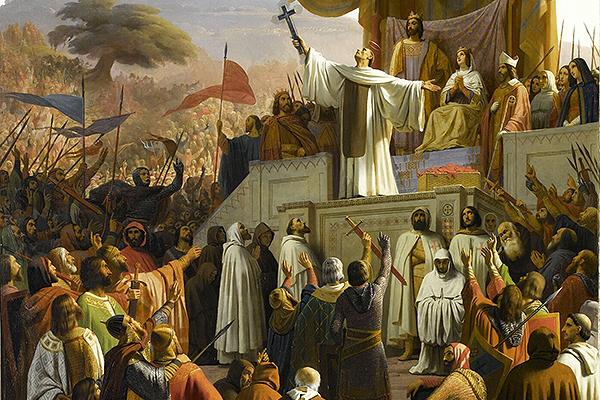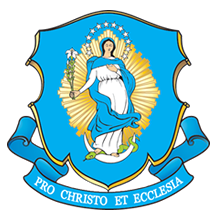
Saint Bernard preaching the second crusade in Vézelay in 1146.
When the storms to temptation burst upon thee, when thou seest thyself driven upon the rocks of tribulation ... call upon Mary. When buffeted by the billows of pride, or ambition, or hatred, or jealousy ... call upon Mary ... With her for guide, thou shalt never go astray...
By Kimberly Bruce
Known as “Doctor Mellifluous,” as praise of Jesus “flowed like honey” from his lips, St. Bernard of Clairvaux was a strong defender of the faith even during trying times with not one but two popes: the antipope Anacletus II, and the true Holy Father, Pope Innocent II.
A wise theologian known for his holiness, St. Bernard, whose feast we celebrate on Aug. 20, is praised for being an eloquent preacher, writer, arbitrator, and monastic reformer.
A family affair
Born to noble parents in 1090 in Burgundy, France, Bernard entered the Cistercian monastery in Citeaux as a young man, following his mother’s death. Thirty-one friends joined him in entering the order, including his brothers and, years later, even his own father.
In 1115, at age 25, he was appointed abbot of a new monastery and sent with 12 monks to begin another community in Clairvaux. This new community became a chief monastic center in Europe. He established other monasteries, too, including ones for women, and frequently travelled beyond France.
Though St. Bernard was offered bishoprics many times, he refused the positions. He undertook many assignments from the Holy See, beginning in 1130, and was advisor to several popes.
He combatted the Cathar heresy (which believed the material world, including the human body, to be evil); condemned anti-Semitism; defended the Jews; and was assigned to preach the Second Crusade to the Holy Land. He wrote many works such as his Sermons on the Song of Songs, as well as books on the Blessed Mother and the Incarnation.
Defending the papacy
Saint Bernard was instrumental in persuading antipope Anacletus to submit to Pope Innocent II, thus restoring peace to the Church, and was a great defender of the Holy See. One of his former students, Bernardo Pignatelli, was elected to the papacy in 1145 as Pope Eugene III.
At a time when the Church was highly criticized, particularly by Peter Abelard, Arnold of Brescia, and Gilbert de la Porrée, St. Bernard penned De Consideratione. This book talked directly about how to be a good pope, along with other spiritual teachings, and he dedicated it to Pope Eugene.
In the encyclical Doctor Mellifluus, Ven. Pope Pius XII quoted St. Bernard’s words to Pope Eugene, written to strengthen him in his authority as the successor of St. Peter:
Parental love knows nothing of lordship, it recognizes not a master but a child even in him who wears the tiara ... Therefore shall I admonish thee now, not as a master, but as a mother, yea, as a most loving mother ... Who art thou? Thou art the High Priest and the Sovereign Pontiff. Thou art the prince of pastors and the heir of the apostles ... by thy jurisdiction, a Peter; and by thy unction, a Christ. Thou art he to whom the keys have been delivered and the sheep entrusted.
“Call upon Mary”
A great advocate for prayers asked through the intercession of our Blessed Mother, St. Bernard is also quoted in the above-mentioned encyclical, saying:
When the storms to temptation burst upon thee, when thou seest thyself driven upon the rocks of tribulation ... call upon Mary. When buffeted by the billows of pride, or ambition, or hatred, or jealousy ... call upon Mary ... With her for guide, thou shalt never go astray; ... so long as she is in thy mind, thou shalt not be deceived; whilst she holds thy hand, thou canst not fall; under her protection, thou hast nothing to fear.
Pope Pius quotes St. Bernard speaking of God’s mercy, too, writing, “Is any one amongst you sad? Let the name of Jesus enter his heart ... Has some one perpetrated a crime, and then misled, moved despairingly towards the snare of death? Let him but invoke this life-giving name, and straightway he shall find courage once more.”
Saint Bernard died on Aug. 20, 1153. His reputation for holiness was so widespread that he was canonized less than 20 years later by Pope Alexander III. In 1830, he was declared a Doctor of the Church by Pope Pius VIII.
Saint Bernard of Clairvaux, pray for us!
{shopmercy-ad}
















